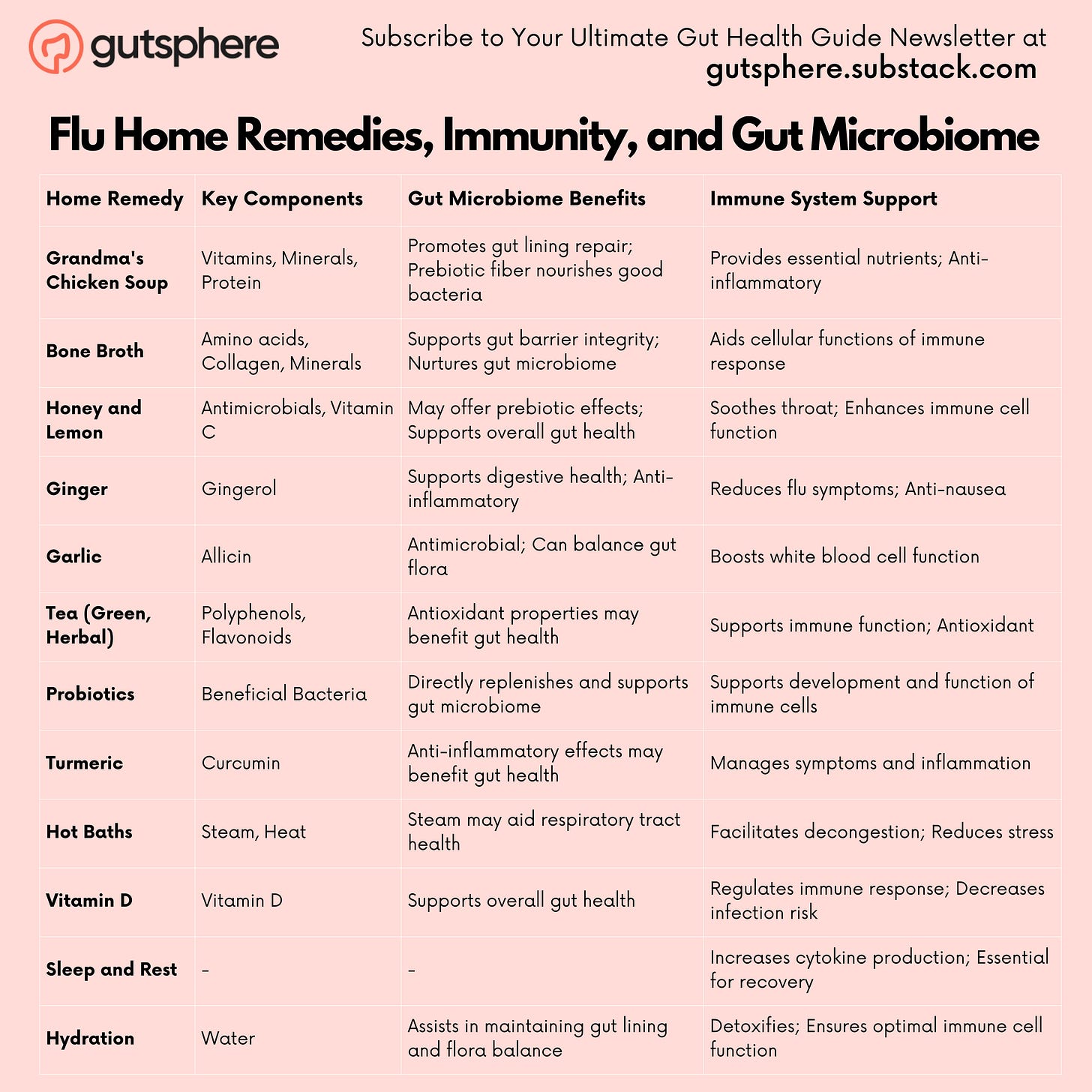Flu Home Remedies, Immunity, and Gut Microbiome
Harnessing Nature's Pharmacy for Flu Season and Beyond
Hi GutSphere Community,
In our journey through flu season, we’ve navigated the terrain of modern medicine—vaccines, medications, and their dialogue with our gut microbiome. It’s an undeniable truth: Around 70% of our immune defense headquarters reside in the gut. This edition, we pivot to the age-old wisdom of home remedies and explore how they can dovetail beautifully with contemporary medical advances to combat the flu.
Our ancestors weren't just whistling in the wind; their remedies are grounded in what we now understand as scientific reality. They bolstered immunity with resources from nature's bounty, laying the foundation for what we recognize today as a harmony of health. As we've discussed, while modern medications are indispensable in severe cases, they're not free of side effects. So, let's circle back to the roots and see how these time-honored practices can serve as our first line of defense, conserving modern interventions for when we need them most.
Join us as we blend the past with the present, ensuring we're armed with the full spectrum of defenses against the seasonal sniffles.
Unveiling the Scientific Support for Traditional Wisdom
Let's embark on an insightful journey that intertwines the threads of tradition with the fabric of scientific evidence, to see how these time-tested remedies can be allies in our fight against the flu and supporters of our gut microbiome.
Grandma's Chicken Soup: A Bowl Full of Immune Support
Grandma's chicken soup has been a staple remedy in many cultures when flu strikes. Its warmth soothes the soul, but its benefits extend far beyond. Rich in vitamins and minerals from the vegetables, and with protein from the chicken, this soup provides nutrients essential for maintaining a robust immune system. But what about its effects on the gut microbiome?
Broth and Bacteria: The broth, a flavorful liquid obtained from simmering bones and vegetables, may have positive implications for our gut bacteria. The bone marrow can offer collagen and other nutrients that the gut lining needs for repair, potentially mitigating the damage caused by inflammatory responses during flu infections.
Vegetable Fiber: The vegetables contribute not only vitamins but also dietary fiber. This fiber acts as a prebiotic, a food source for beneficial gut bacteria, which in turn can help maintain a balanced microbial community.
Herbs and Spices: Often, chicken soup is seasoned with herbs like garlic, thyme, and oregano, which have antimicrobial properties that can benefit both our immune system and the gut microbiome. These herbs may help suppress harmful bacteria while fostering an environment where beneficial microbes can thrive.
Hydration and Heat: The warm liquid helps maintain hydration and can soothe a sore throat. The heat from the soup can also help loosen mucus, making it easier to breathe.
Amino Acids and Minerals: Chicken is a source of protein and specific amino acids like cysteine, which can help thin mucus and reduce congestion, while the minerals from the bones and vegetables can support immune function.
Anti-inflammatory Properties: The vegetables in the soup often include carrots, onions, and celery, which contain antioxidants and vitamins. These can reduce inflammation, potentially helping the body fight off infection more effectively.
Bone Broth: A Gut Lining's Ally
Bone broth has experienced a resurgence, lauded for its health benefits. Let's focus on its potential role in supporting gut health, particularly during times of illness:
Amino Acids: Bone broth is a rich source of amino acids like glutamine, which is crucial for the health of enterocytes, the cells lining the gut. Glutamine is a fuel source for these cells, and adequate amounts can help maintain the integrity of the gut barrier, potentially preventing undesirable substances from triggering an immune response.
Minerals: The calcium, magnesium, and phosphorus leached from the bones into the broth are essential minerals that play a role in many bodily functions, including the health of our digestive system.
Collagen: The gelatin formed during the cooking process is derived from collagen, which can help form a protective lining in the gut, providing a nurturing environment for the gut microbiome to flourish.
Honey and Lemon:
Antimicrobial Effects: Honey has natural antimicrobial properties, and when used to treat a sore throat, it can provide a protective coating and reduce irritation.
Vitamin C: Lemon juice is high in vitamin C, an antioxidant that can support various cellular functions of both the innate and adaptive immune system.
Ginger:
Gingerol: The active component of ginger, gingerol, has anti-inflammatory and antioxidative properties, which can help reduce the symptoms of the flu and support the immune system.
Antinausea: Ginger can be beneficial in reducing nausea and vomiting, which can sometimes accompany the flu.
Garlic:
Allicin: Garlic contains a compound called allicin, which has been shown to boost the disease-fighting response of some types of white blood cells when they encounter viruses, such as the viruses that cause the common cold or flu.
Tea:
Antioxidants: Teas, especially green tea, are filled with polyphenols and flavonoids, which are antioxidants that protect the body from free radicals and support immune function.
Probiotics:
Gut Microbiome Support: Probiotic foods contribute to the health of the gut microbiome, which is a crucial part of the immune system. A healthy gut microbiome can help prevent the growth of harmful pathogens and has been shown to influence the development and function of immune cells.
Turmeric:
Curcumin: The compound curcumin has strong anti-inflammatory properties, which can help the body in managing the symptoms and systemic inflammation caused by viral infections.
Hot Baths:
Steam Inhalation: The steam can help with decongestion, easing the breathing.
Relaxation: The relaxation effect can reduce stress, which is known to have a negative impact on the immune system.
Vitamin D:
Immune Regulation: Vitamin D is important for the regulation of the immune system. It influences both innate and adaptive immune responses and has been linked to a decreased risk of viral infections.
Sleep and Rest:
Cytokine Production: Sleep can increase the production of cytokines, which are necessary in fighting off infections. Lack of sleep can reduce immune function.
Hydration:
Detoxification and Circulation: Staying hydrated helps the body naturally eliminate toxins and other bacteria that may cause illness. Adequate fluid intake also ensures good blood flow, which is necessary for immune cells to travel throughout the body to perform their functions.
Sip, Savor, and Soothe - The Way Forward
As we navigate through flu season, let's appreciate and utilize the wisdom passed down through generations, supported by scientific inquiry and evidence. By incorporating these traditional home remedies into our routine, we are not only paying homage to the past but also reinforcing our body's natural defenses, including our ever-important gut microbiome.
In harmony with tradition and science, we can embrace these natural remedies to complement our modern healthcare practices, enhancing our well-being and resilience against the seasonal flu.
Also please remember, while home remedies can be beneficial for mild symptoms and general health maintenance, they are not a substitute for professional medical advice, diagnosis, or treatment, especially in the case of severe illness. Always consult with a healthcare provider for any medical concerns.
Next: Synergy for a Stronger Gut
Request
Share
Our sincere request to you is to share the newsletter with your friends, family, and community so that they can benefit from the content. Also it will help us grow the newsletter, and eventually, as we release more content, digital tools, and more we will enable people around the world to live chronic disease free.
Subscribe
Feedback
Also, please give us feedback so that we can improve the content. And if there are any topics that you want us to cover please send us your questions and topics. Furthermore, if you try any of the things we provided information please share your experience with us.
Thank You
GutSphere Team
Disclaimer
Please note that the information provided in this newsletter is for informational purposes only and should not be considered as a substitute for professional medical advice, diagnosis, or treatment. If you have any concerns or questions about our health, please consult with a licensed healthcare professional. The information contained in this newsletter is not intended to diagnose, treat, cure, or prevent any disease. The publisher and authors of this newsletter assume no responsibility for any adverse effects that may result from the use of the information contained herein.



